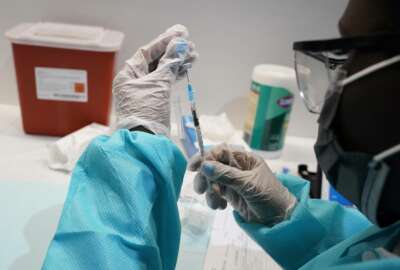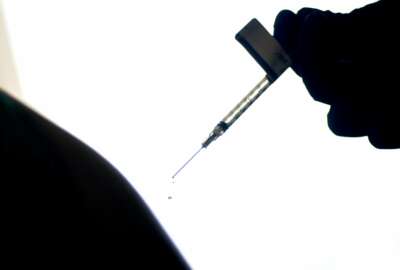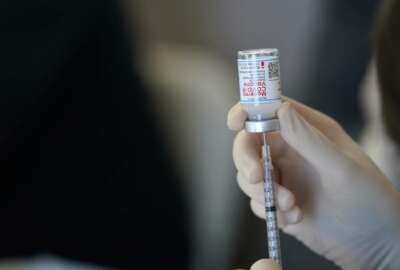Hubbard Radio Washington DC, LLC. All rights reserved. This website is not intended for users located within the European Economic Area.
For federal managers, new vaccine and testing policy brings anxiety — and more unanswered questions
Federal managers say key details of the administration's vaccine and testing program are still unresolved, and they worry about enforcing a policy with the work...
Nearly one month after the Biden administration first announced plans to adopt a vaccine and testing policy for federal employees and contractors, managers — presumably the ones charged with implementing and enforcing the new program on the ground level — say they’re still looking for answers about how it’ll work.
The Safer Federal Workforce Task Force, a group led by the Office of Management and Budget, Office of Personnel Management and others, has so far issued two rounds of guidance on the new policy, covering testing, disciplinary consequences, labor obligations and the new attestation forms that employees will need to complete describing their vaccination status.
On Wednesday afternoon, the task force issued new frequently asked questions on taking leave to get vaccinated.
Professional organizations representing federal managers say they’ve met with the task force on multiple occasions to discuss the vaccine and testing policy.
But they’re worried key pieces of the new program are still unresolved, and they say they’re ill-equipped at this point to handle tricky questions from the federal workforce, which — like the rest of the country — has pockets of vaccine hesitancy and resistance.
Guidance has been “minimal” and the planning to date has been “stressful” for managers and supervisors, said Craig Carter, national president of the Federal Managers Association.
Professional associations don’t have exact data and they’re relying on anecdotal conversations with their members about the vaccine. But considering a little more than half of all Americans are fully inoculated against COVID-19 — and the federal workforce is in many ways a representative subset of the American public — they assume roughly 50% of the nation’s 2.1 million federal employees are unvaccinated.
That means agencies may potentially need to test about 1 million federal workers once or twice a week, the associations said.
“In some ways it’s anecdotal, but we did collectively share with OPM, OMB, the White House and the CDC that we do believe that the workforce is vaccine hesitant in a way that I don’t necessarily believe political heads understand,” said Chad Hooper, executive director of the Professional Managers Association, which represents IRS supervisors. “There is no intentional outreach to the civil service to change that in some way.”
Those estimates, of course, will vary depending on geographic location and vaccine uptake in the workforce. Unvaccinated employees who telework regularly don’t need to submit to testing, meaning the associations’ ballpark estimates are likely lower.
Still, the prospects of potentially testing 1 million federal employees each week is daunting, and the professional associations all said they’re still waiting to see how agencies will pay for and implement such programs.
“That’s a logistical nightmare,” Carter said.
A small portion of FMA members have underlying medical conditions and have been told by their doctors not to get the vaccine, he said. Others were waiting for the Food and Drug Administration to grant approval to the COVID-19 vaccine, which it did Monday.
“[For] other people, it’s just the politics of it,” said Carter, who added FMA is not taking a position on the federal vaccine policy for that reason. “They don’t want to be told what to do by the city, state or federal level of government.”
In some ways those sentiments track with Ron Eritano, executive director of the Federal Aviation Administration Managers Association, as well. He said some air traffic controllers have a military background and more readily respond to demands from the chain of command, but others don’t.
“Like every other subset of society, there is a level of vaccine hesitancy that exists across the workforce and the FAA, just like there is in other places,” said Eritano, who emphasized the agency has and continues to be communicative and transparent with his association during the pandemic. “Trying to figure out the role of managers without the proper guidance is tricky.”
The three professional associations told Federal News Network agencies were in a wait-and-see mode with the new policy. They said some agencies have acknowledged the challenges with implementing the new vaccine and testing policy and have hinted that employees will see an articulated plan with specific timelines soon.
The National Treasury Employees Union said it expects to discuss the details of the testing protocols with their agencies before they’re implemented.
“Those discussions have yet to begin, presumably because agencies are still developing their own testing procedures,” Tony Reardon, NTEU national president, said.
NTEU said it doesn’t have a reason to believe the federal workforce is more or less vaccine hesitant than the rest of the American public. The union has actively encouraged its members to get vaccinated, it said.
The administration’s latest frequently asked questions on testing cleared up some, but certainly not all of the union’s questions.
NTEU said it welcomed, for example, guidance that clarified agencies would cover the costs of testing unvaccinated employees on duty time.
But it’s unclear whether agencies will pay for testing costs on behalf of their employees, or whether workers will pay up front for a test themselves and get reimbursed later, NTEU said.
The largest federal employee union, the American Federation of Government Employees, declined to comment for this story.
Where’s the money?
Paying for a testing program for federal employees — regardless of its size and scope — has raised many questions among managers.
“We don’t have a lot of clarity on who should be requiring the testing, who would conduct the testing, etc.,” Eritano said. “We just know that the FAA has assured us that they understand that that is a serious concern, and they’re trying to work with OPM and others to figure out the best system for our folks.”
It’s unclear whether agencies have leftover COVID-19 relief funds or other available operating expenses to pay for mass testing, the associations said.
“For all of the good FAQs and things that they’re putting out around this testing protocol, the administration has given no instruction to agencies on how they will pay to implement a mass testing program,” Hooper said.
Neither Carter nor Eritano said they knew how the agencies they worked with would pay for the testing of unvaccinated employees.
In an email to Federal News Network, OMB said it’s working with agencies to identify funding and acquisition support for employee testing programs.
But adding new and potentially expensive testing requirements near the end of the fiscal year isn’t ideal either, the associations said.
“Especially with the fact that it looks like we’re dealing with another continuing resolution by the end of September and we’ll be working under previous year’s funding, something like that could be extremely expensive,” Eritano said.
According to the administration’s guidance, agencies can contract out for testing or establish a program in house, but it leaves the details up to each organization.
“The IRS is a tax enforcement mechanism; we are not public health specialists,” Hooper said. “The IRS does not have the ability to know how to contract testing in its 550 locations. It’s an absurd ask to put on an agency without any top-down direction. It’s a great cause of frustration. The IRS knows it’s waiting for this information, then I go to OPM and then OPM’s story is, ‘Well, we’re waiting for the IRS to tell us what their plan is.'”
“I am concerned that when we hit those kind of logjams then nothing will happen, and that [is] kind of what’s happened right now,” he added.
Managers worry about enforcing disciplinary action
Beyond the logistics of standing up testing programs from scratch, federal managers are also anxious about potentially enforcing disciplinary action on employees for lying about their vaccination status or refusing a test.
Carter said he’s worried about his members having potentially politically-fraught conversations about the vaccine with their co-workers — and the possibility of having employees protest the new policy and taking paid administration leave while the disciplinary process plays out.
“I have really deep concerns about the disciplinary action. It’s a lot of politics,” he said. “If you’re dead [set] against it, it doesn’t matter if the FDA approved it or not.”
For Carter, the policies themselves create the potential for disparate treatment in the federal workforce, because only unvaccinated employees who can’t telework are subject to regular testing — and, if they refuse, may face discipline.
Unvaccinated but teleworking employees who might refuse testing likely won’t face discipline, because the nature of their jobs allows them to work from home and avoid the new testing requirements altogether, Carter said.
When asked about the associations’ concerns with potential disciplinary action and the lack of clear guidance on testing, an OPM official said: “Once agency testing programs are established, OPM will work with agencies on strategies to maximize compliance. Employees who refuse to comply with testing requirements are putting other employees, contractors and visitors to federal workplaces at risk. They will be subject to discipline in the same way as employees who refuse to comply with any other workplace safety policy.”
Eritano said he’s concerned the stress of implementing and enforcing the new vaccine and testing policy will compel FAA supervisors to retire or take on lower-level positions in the agency’s bargaining unit. Some FAA managers have already left in recent months.
“We’ve been working under this halo of not having enough supervisors to begin with well before COVID,” Eritano said, though the pandemic made it worse.
“We’re already short-staffed in general,” he added. “The concern is that if you add another layer of responsibility like this that makes an already difficult job more difficult. It could, at the very least, add a whole new layer of stress that they don’t need at this point in time without some type of clear process — even lead people leaving our ranks and going back to the frontline ranks.”
For federal contractors, the current guidance on the new federal vaccine policy raises even more questions.
“Some agencies have a single requirement that they’ve put out that applies to every contractor, every onsite contractor that is, for that agency. Others are doing it one contract at a time. And still others haven’t put out any guidance at all, but individual programs and activities in those agencies are putting out their own requirements,” David Berteau, president and CEO of the Professional Services Council, told the Federal Drive with Tom Temin in a recent interview. “This is not so bad if you have an individual who works full-time, all the time, every day for the same contract at the same contractor at the same location. But that’s not the case.”
For one of PSC’s member companies, at least half the workforce works on multiple contracts simultaneously, posing confusion for employees who have more than one agency policy — and possibly more if their agency’s policies vary even by the individual contract — to remember.
“You could easily end up with a contractor, a contracted worker, who has two or three or four or five different regimes they have to carry out, different forms to fill out, different documents; it’s chaos,” Berteau said.
Copyright © 2024 Federal News Network. All rights reserved. This website is not intended for users located within the European Economic Area.
Nicole Ogrysko
Nicole Ogrysko is a reporter for Federal News Network focusing on the federal workforce and federal pay and benefits.
Follow @nogryskoWFED
Related Stories
Related Topics
All News
Chad Hooper
Covid-19
COVID-19 vaccine
COVID-19 vaccine hesitancy
COVID-19 vaccine mandate
Craig Carter
David Berteau
Federal Aviation Administration Managers Association
Federal Managers Association
Management
National Treasury Employees Union
Professional Managers Association
Professional Services Council
Ron Eritano
Workforce
Workforce Rights/Governance






